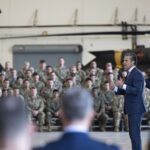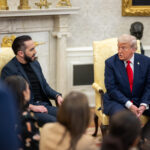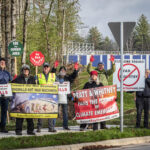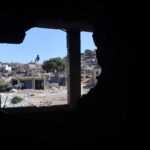It is no secret that more men than women have traditionally worked in nonproliferation, arms control, and disarmament, especially as policymakers. But given that women constitute around 45% of the world’s labor force, the extent to which this remains true today is, well, something of a bombshell. According to the website for the State Department’s Bureau of International Security and Nonproliferation, only 5 of the 17 individuals that comprise its leadership are women. The breakdown is roughly the same at the Bureau of Arms Control, Verification, and Compliance, whose website shows that just under three quarters of its leadership are men. We see something similar in other areas of government with weapon of mass destruction (WMD) responsibilities, like the National Nuclear Security Administration. The semi-autonomous agency, which oversees the US nuclear stockpile, reported that just 33% of its 2357-person workforce was made up of women in March 2018.
It is important to highlight that this is a widespread and deeply entrenched problem and one that is not unique to US government. In fact, a recent report found that, on average, women made up just 27% of the experts on staff at 22 security-focused think tanks in Washington DC. While we are fortunate that this is not the case where we work, it is clear that gender imbalance persists in the expert community, too. Likewise, there are almost identical gender gaps across the UN disarmament machinery. Of the 1226 national delegates who registered for the 2015 Nuclear Nonproliferation Treaty Review Conference, for example, only 26.5% were women. And in 2017, women made up just 31% of registered delegates at the negotiations on the Treaty on the Prohibition of Nuclear Weapons
These low numbers of female engagement pose very real challenges for the nonproliferation, arms control, and disarmament communities. For one thing, as this McKinsey study shows, companies with gender diversity demonstrate improved group thinking and generate better returns. This means that, when it comes to addressing the threat of WMD, the gender gap actually makes us less effective. At a moment when the risk of nuclear exchange is arguably higher than at any time since the Cuban Missile Crisis, this is a disadvantage we can’t afford. By the same token, the gender gap means that women are largely excluded from high-level decision-making about WMD — ironic when you consider that they would be equally, if not more severely, affected by the actual use of these weapons. Shutting women out of this discourse reinforces stale stereotypes about the “masculine” nature of hard security issues that stifle innovative thinking where we need it most.
Shutting women out of this discourse reinforces stale stereotypes about the “masculine” nature of hard security issues that stifle innovative thinking where we need it most.
We are not the first to point out that the gender gap in WMD policy is problematic and unsustainable in the long run. We also understand that simply increasing women’s representation in this domain will not necessarily enhance their influence on decision-making. To truly bridge this gap, we believe it is necessary to train, mentor, and support women at the start of their careers so they can lead on WMD-related issues in the future. Because the lack of gender diversity is self-sustaining, we cannot expect any major shifts without concrete efforts to undermine the status quo.
To this end, and as early career researchers in this field ourselves, we are leading targeted programs to encourage other young women to pursue WMD-related careers and help them succeed in this domain. At the James Martin Center for Nonproliferation Studies in Monterey, California, Sarah has launched the Young Women in Nonproliferation Initiative to build awareness among undergraduate women about nonproliferation, arms control, and disarmament issues. The Initiative introduces students to these topics through lectures and events at US women’s colleges. It then supports them as they work toward careers in the field through mentorship and an online repository of tools and resources for further training. At Women of Color Advancing Peace and Security (WCAPS), Sylvia co-leads a WMD working group that allows its members to have detailed discussions on nuclear policy and nonproliferation issues and promotes the work of women of color on their portals. WCAPS also conducts webinars and interviews, organizes workshops and seminars, provides mentorship opportunities and produces policy papers and reports on topical WMD issues. These are some specific ways in which we are trying to change the current situation.
Fortunately, we are not alone in our efforts, and more people are paying attention to this issue than ever. All-male panels (“manels”) have been called out at conferences, and a number of male NGO experts and organization leaders have pledged to ban them. Alexandra Bell and Kelsey Davenport’s blistering critique of the “marticle” likewise took to task media outlets that quote exclusively men when covering international security issues. Lists of women experts are being created, updated, and circulated within our community so there is no excuse for excluding them from the dais or the news. Even though the pace of progress is slow, these efforts are crucial to increasing the visibility of women who are already in the field and making space for the next generation to join them.
The initiatives in which we are engaged bolster the credentials of young women in the WMD domain and help them build relationships to elevate one another. Research shows that peer networks help to empower women in STEM, and we know from personal experience that they facilitate greater innovation, camaraderie, and engagement through professional collaboration in our field. We became friends and colleagues after meeting at a June 2016 CTBTO Youth Group event, and we have teamed up successfully on several projects over the past two years. In part, because we come from different countries with different backgrounds, joining forces has given us fresh ideas for how to address WMD-related challenges, including the ones outlined here. At the same time, knowing that we have one another’s support encourages us to take bigger risks and be more ambitious in our own professional work.
As Wendy Sherman has observed, personal connections like ours help women succeed in international security in the long run. First, though, they need to know that they have something worth saying and be confident that it will be heard. With this in mind, we hope others will join us in bringing more young women’s voices to nonproliferation, arms control, and disarmament, and we invite our peers to be part of the networks we are building as we do so. The moment is right to make real progress toward fixing the gender imbalance in this and other fields. The more inclusive discourse that will result will help to make us all little safer at a time when we really need it.
Sarah Bidgood is a senior research associate and project manager at the James Martin Center for Nonproliferation Studies (CNS). She is the co-editor of Once and Future Partners: The United States, Russia, and Nuclear Non-proliferation, published in 2018.
Sylvia Mishra is a Herbert Scoville Fellow working on nuclear strategy and nonproliferation, South Asian security and emerging technologies. She was a former Visiting Fellow at CNS.














